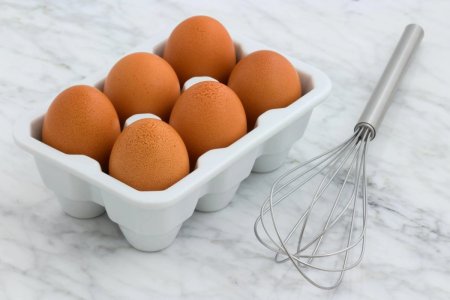Egg-sponential price increases: Insider tips to stretch your eggs further before prices spike again
By
Veronica E.
- Replies 0
If you've stepped into the grocery store recently, you may have noticed your egg carton feels a bit heavier on your wallet. And it's not just you—the price of eggs has skyrocketed, leaving many of us wondering how we can still afford this kitchen staple.
Experts are predicting that these high prices could climb even higher, leaving us all to tighten our belts when it comes to grocery shopping.
But don’t let these rising costs scramble your budget! Here at The GrayVine, we know how important it is to make every dollar count, and that’s why we're here to offer practical, smart solutions to help you stretch your eggs farther and get the most out of each carton.
Whether you're cooking for yourself or feeding a family, we’ve got some easy tips that will help you make your dozen last longer without sacrificing quality or taste.

So, let’s crack open some egg-stending strategies that could save you a lot more than just a few cents!
Understanding the Egg-sponential Price Increase
Before we talk about how to extend the life of your eggs, it’s helpful to know what’s behind the surge in prices. A combination of increased feed costs, higher demand, and an outbreak of avian influenza has resulted in a significant reduction in the supply of eggs.
These factors together have caused the current spike in egg prices, catching many shoppers by surprise.
Making Your Eggs Last: Storage and Preservation
Let’s go over some tried-and-true methods to help keep your eggs fresh for as long as possible. With a little care, you can ensure your eggs last until you're ready to enjoy them.
1. Store them right: Eggs should be kept in the coldest part of your fridge, not in the door, where temperatures tend to fluctuate. It's also important to keep them in their original carton, as it helps prevent them from absorbing odors or flavors from other foods.
2. Check the dates: Be sure to check the 'sell-by' or 'expiration' date on the carton. While eggs are often safe to use beyond these dates, they’re a helpful guideline for determining their freshness.
3. Conduct the float test: If you're not sure whether an egg is still good, give it a float test. Place it in a bowl of water. Fresh eggs will sink to the bottom, lying flat. If the egg stands upright or floats, it’s time to toss it.
4. Freeze for the future: Did you know you can freeze eggs? Just crack them into a freezer-safe container, beat the yolks and whites together, and freeze. When you're ready to use them, simply thaw in the fridge. Keep in mind, frozen eggs are best for cooking and baking, rather than raw applications.
5. Preserve with pickling: Pickled eggs are not only a tasty treat but also an excellent way to preserve eggs. Just be sure to follow safe canning practices to avoid any health risks.
Getting Creative in the Kitchen
With egg prices on the rise, it’s the perfect opportunity to get creative in the kitchen and make each egg stretch further. Here are some clever ideas:
Market fluctuations, such as the rising cost of eggs, are a part of life we all have to navigate from time to time.
The key is staying informed and adaptable—making simple adjustments to our habits while sharing helpful tips with our community. By supporting each other, we can manage these changes with ease and confidence!

Have you been feeling the effects of rising egg prices? Do you have any tips for extending the life of your eggs, or maybe a favorite egg substitute? Perhaps you’ve discovered a new recipe that uses fewer eggs—let us know! Share your experiences and ideas with us in the comments below.
Also read: The surprising state where egg prices have hit $10 – will your state be next?
Experts are predicting that these high prices could climb even higher, leaving us all to tighten our belts when it comes to grocery shopping.
But don’t let these rising costs scramble your budget! Here at The GrayVine, we know how important it is to make every dollar count, and that’s why we're here to offer practical, smart solutions to help you stretch your eggs farther and get the most out of each carton.
Whether you're cooking for yourself or feeding a family, we’ve got some easy tips that will help you make your dozen last longer without sacrificing quality or taste.

Egg-cellent ways to make your eggs last longer—let's crack into some smart tips! Image Source: Pexels / Estudio Gourmet.
So, let’s crack open some egg-stending strategies that could save you a lot more than just a few cents!
Understanding the Egg-sponential Price Increase
Before we talk about how to extend the life of your eggs, it’s helpful to know what’s behind the surge in prices. A combination of increased feed costs, higher demand, and an outbreak of avian influenza has resulted in a significant reduction in the supply of eggs.
These factors together have caused the current spike in egg prices, catching many shoppers by surprise.
Making Your Eggs Last: Storage and Preservation
Let’s go over some tried-and-true methods to help keep your eggs fresh for as long as possible. With a little care, you can ensure your eggs last until you're ready to enjoy them.
1. Store them right: Eggs should be kept in the coldest part of your fridge, not in the door, where temperatures tend to fluctuate. It's also important to keep them in their original carton, as it helps prevent them from absorbing odors or flavors from other foods.
2. Check the dates: Be sure to check the 'sell-by' or 'expiration' date on the carton. While eggs are often safe to use beyond these dates, they’re a helpful guideline for determining their freshness.
3. Conduct the float test: If you're not sure whether an egg is still good, give it a float test. Place it in a bowl of water. Fresh eggs will sink to the bottom, lying flat. If the egg stands upright or floats, it’s time to toss it.
4. Freeze for the future: Did you know you can freeze eggs? Just crack them into a freezer-safe container, beat the yolks and whites together, and freeze. When you're ready to use them, simply thaw in the fridge. Keep in mind, frozen eggs are best for cooking and baking, rather than raw applications.
5. Preserve with pickling: Pickled eggs are not only a tasty treat but also an excellent way to preserve eggs. Just be sure to follow safe canning practices to avoid any health risks.
Getting Creative in the Kitchen
With egg prices on the rise, it’s the perfect opportunity to get creative in the kitchen and make each egg stretch further. Here are some clever ideas:
- Embrace egg-cellent substitutes: In some recipes, you can reduce the number of eggs needed by using alternatives like applesauce, mashed bananas, or commercial egg replacers. These are especially useful in baked goods.
- Go for gold with yolks: If a recipe calls for only egg whites or yolks, save the other half for later! Egg whites can be frozen for future use, while egg yolks can be incorporated into rich sauces or custards.
- Stretch with add-ins: When preparing omelets or scrambled eggs, add extra vegetables, cheese, or meats. Not only does this add flavor and nutrition, but it also helps you use fewer eggs per serving.
The key is staying informed and adaptable—making simple adjustments to our habits while sharing helpful tips with our community. By supporting each other, we can manage these changes with ease and confidence!
Key Takeaways
- Egg prices have risen significantly, leaving many people looking for ways to save money on this kitchen staple.
- Experts predict that egg prices could increase even further, putting more strain on grocery budgets.
- Practical tips are shared for making eggs last longer without sacrificing quality or taste, including proper storage and preservation methods.
- Strategies include freezing eggs, conducting the float test, and using egg substitutes in recipes.
- Creative ideas for using fewer eggs, such as adding vegetables or cheese to dishes like omelets and scrambled eggs.
Have you been feeling the effects of rising egg prices? Do you have any tips for extending the life of your eggs, or maybe a favorite egg substitute? Perhaps you’ve discovered a new recipe that uses fewer eggs—let us know! Share your experiences and ideas with us in the comments below.
Also read: The surprising state where egg prices have hit $10 – will your state be next?






